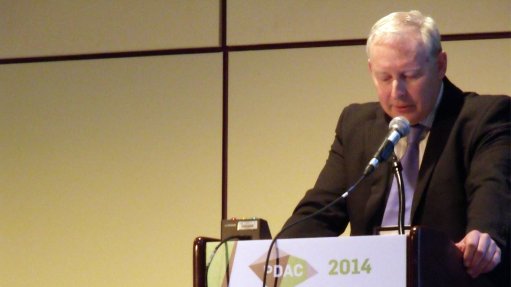
BlackRock Minerals chairperson Sean Cleary
Photo by: Simon Rees
TORONTO (miningweekly.com) – Having a strong management team, a high-quality project and the will to succeed are critical for any company wishing to secure private equity funding, chairperson of BlackRock Minerals Sean Cleary told delegates at the Prospectors and Developers Association of Canada convention last week.
“You have to start with a quality project and with quality people,” Cleary said. “I would recommend you start early and stick with high quality … Focus on hiring talented stars and not trainees.”
BlackRock is a private company and its eponymous iron-ore, titanium and vanadium project is located in Lac Doré complex near Chibougamau, Quebec. Two sovereign wealth funds are among the company’s many partners.
“[In addition], you need a capital strategy: are you going to be public or private?” Cleary said.
“You need to develop an executable strategy and you must think long-term,” he added. “I also believe markets are almost always turbulent; you should take the view that capital will always be scarce.”
Early and frequent discussion with stakeholders is important as well, particularly with any aboriginal bands or indigenous groups that may be affected by a project. “The earlier you communicate with stakeholders, the more success you’ll have with your project. Without that, projects are lost,” he said.
Companies should have several strategies in place. “With capital plans you need backup plans: a plan A, B, C and D. This includes every aspect of potential financing from royalty structures, to offtake agreements, to private-equity channels,” he continued.
In BlackRock’s case, the company has remained private, which has afforded more control and helped to de-risk many aspects of the work. It also meant the company had greater shareholder stability.
“However, I’d say private capital is more difficult to attract; it requires the highest-quality projects and teams,” Cleary said. “Sometimes it can be frustrating because of the significant time, effort, commitment and investment you have to make in seeking out alternative sources of capital. Deals can take a year to two years to complete.”
In searching for investors and capital flows, BlackRock carefully considered its end-user markets rather than simply focusing on Bay Street, Toronto’s financial hub.
“We looked to where the customers were for the kinds of product [we will be producing]. Geographically, we focused on pools of capital where the customer bases were; we knew they’d understand what we were doing, the significance of what we were doing, and the value of what we were doing,” Cleary explained.
“The investment in time and money to seek out some of those groups was substantial,” he added.
Support for the company’s efforts has also come from Canada’s federal government and from the province of Quebec. “We have strong governmental support because our intention is to create a lot of economic activity and jobs for the province of Quebec,” Cleary said.
“For any start-ups, you must recognise that there are going to be dark days and that this is a risky pursuit. But do it right and you’ll also have great days. And risk-taking is often rewarded if it is done thoughtfully,” he concluded.